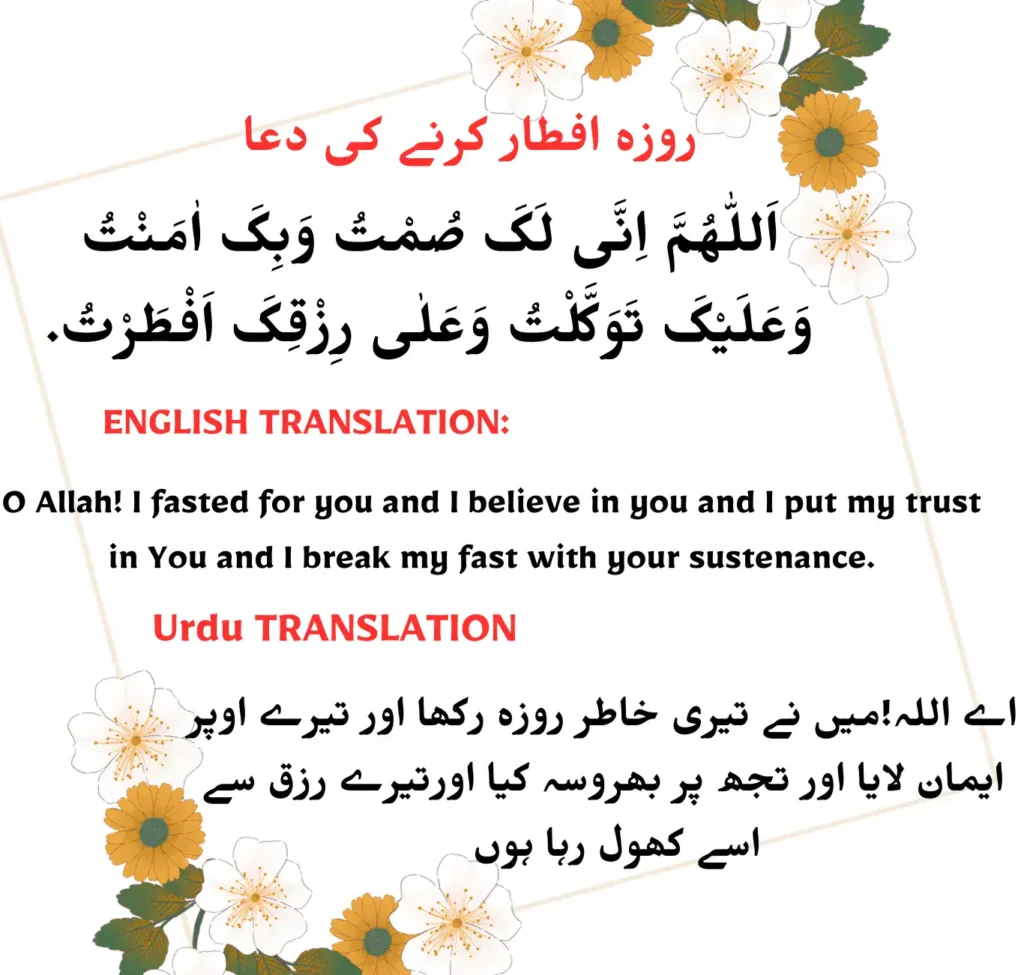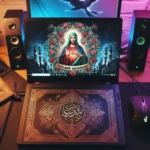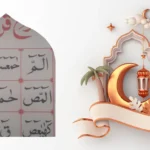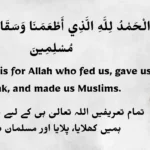Introduction:
- Briefly introduce the concept of Ramadan and the significance of fasting.
- Highlight the importance of Iftar, the meal that breaks the fast each day.
- Emphasize the role of dua (supplication) in expressing gratitude to Allah (SWT) for the blessings of Ramadan.
What is Roza Kholne Ki Dua?
- Explain the meaning of the term “Roza Kholne Ki Dua”.
- Provide the dua in Arabic script along with the transliteration for easier pronunciation.
- Include the English translation to ensure everyone understands its meaning.
Understanding the Dua:
- Break down the dua verse by verse, explaining the significance of each part.
- Use simple and clear language to make it accessible to a broad audience.
- Briefly mention the concept of Niyyah (intention) before starting the fast and additional supplications that can be recited after Iftar.
Where to Find the Dua in Different Languages:
- Mention the availability of the dua in various languages like Hindi, Urdu, and English.
- Briefly discuss any variations in the dua specific to the Shia tradition (if applicable).
- Suggest resources like websites or YouTube channels where users can find the dua in their preferred language or listen to recordings for pronunciation help.
The Importance of Dua:
- Go beyond just providing the dua; explain the significance of reciting it with sincerity and gratitude.
- Highlight how it strengthens the connection with Allah (SWT) and reflects on the spiritual aspect of fasting.

Here’s the Dua in Arabic:
اللهم لك صمت وعلى رزقك افطرت، فلك الحمد اللهم اغفر لي
the transliteration:
Allāhumma laka sumtu wa ‘ala rizqika aftartu, fa laka al-hamdu, Allahumma اغفرلي (a’udhu billahi mina al-kabaa-ir)
Here’s the translation in English:
O Allah, for You I fasted, and upon Your provision I break my fast, all praise is due to You, O Allah, forgive me.
Understanding the Dua:
- “Allahumma laka sumtu” (O Allah, for You I fasted): This acknowledges that the fast was undertaken solely for the sake of Allah (SWT).
- “Wa ‘ala rizqika aftartu” (and upon Your provision I break my fast): This expresses gratitude to Allah (SWT) for the food that will nourish the body after the fast.
- “Fallaka al-hamdu” (all praise is due to You): This is a declaration of thanks and appreciation for all of Allah’s (SWT) blessings.
- “Allahumma اغفرلي” (O Allah, forgive me): This is a plea for Allah’s (SWT) forgiveness for any shortcomings during the fast.
Conclusion:
- Briefly summarize the importance of Roza Kholne Ki Dua in observing a fulfilling Ramadan fast.
- End with well wishes for a blessed Ramadan (e.g., “Ramadan Kareem”).
| A Guide to Roza Rakhne Ki Niyyat |
| Nazar Ki Dua | Ward Off Evil Eye |
| Dua e Qunoot witr |
| A Guide to Subah Uthne Ki Dua |
The answer lies in the beautiful (Fast-Breaking Prayer)! This heartfelt supplication expresses gratitude to Allah (SWT) for the strength and sustenance He provided throughout the day. Learn the dua, its meaning, and find resources in your preferred language – all within this article!
You’re in luck! This guide provides the dua in Arabic script, transliteration, and English translation. Plus, we’ll point you towards resources for the dua in Hindi, Urdu, and more! Deepen your Ramadan experience with this powerful prayer of gratitude.
It’s more than just words! The Roza Kholne Ki Dua is a bridge between you and Allah (SWT). By reciting it with sincerity, you express gratitude for the blessings of Ramadan and strengthen your spiritual connection. Unveil the power of gratitude with this beautiful tradition!




